Peter MALONE
Saturday, 18 September 2021 19:32
More the Merrier, The

THE MORE THE MERRIER
US, 1943, 104 minutes, Black and white.
Jean Arthur, Joel McCrea?, Charles Coburn, Bruce Bennett. Directed by George Stevens.
The More the Merrier is in the tradition of the 40s screwball comedies. However, it has a World War Two setting - the background is more serious, but the style is still enjoyable. Jean Arthur (who had appeared in some of Frank Capra's excellent comedies including Mr Deeds Goes to Town, Mr Smith Goes to Washington and You Can't Take it With You) is expert at this kind of comedy. Joel McCrea? had appeared in many of the comedies and starred in Preston Sturges' The Palm Beach Story. The elderly Charles Coburn, at the beginning of a screen career, received the Oscar for Best Supporting Actor. He was to go on and do variations of this role for the next fifteen years,- to great effect.
Direction is by George Stevens, director of many dramas and romances of the 30s, 40s and 50s and made such films as I Remember Mama, A Place in the Sun, Giant winning Oscars for the latter two films).
The film was remade with the Tokyo Olympics as the setting for Walk, Don't Run with Jin Hutton, Samantha Eggar and Cary Grant in the central roles.
1. The appeal of this 1940s comedy? The tradition of the screwball comedy? The atmosphere of World War Two and Washington?
2. The work of George Stevens, drama and comedy? The strength and experience of the cast? Charles Coburn's Oscar-winning performance?
3. Atmosphere of Washington, the city, the streets, crowded, the apartments, workplaces? The score? The song: 'Damn the Torpedoes'?
4, The appeal of the screwball comedy and the romantic comedy? The battle of the sexes? Visual and verbal wit? The clashes and the happy ending?
5. Jean Arthur's style and presence as Connie: career, a career woman, her work, the war, her encounter with Mr Dingle, renting the apartment, the encounter with Joe, the sub-letting? Her reluctance? Timetables and the comedy of timing? innuendo? Clashes with Joe? The influence of Mr Dingle? From clash to romance? The happy ending?
6. Joe, the American hero, work, looking for apartment, the sub-letting, friendship with Mr Dingle, the arrangement, the comedy of the clash, the comedy of the timing? Love blossoming?
7. Charles Coburn as Benjamin Dingle: age, nice, background, sardonic, playing Cupid, the apartment, sub-letting, the comedy of the timing?
8. Life in Washington: offices, newspapers, restaurants?
9. The background of the war effort, the comedy to entertain audiences? Morale-boosting with the light touch?
Published in Movie Reviews
Published in
Movie Reviews
Tagged under
Saturday, 18 September 2021 19:32
More Wild Wild West
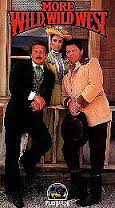
MORE WILD WILD WEST
US, 1980, 94 minutes, Colour.
Robert Conrad, Ross Martin, Jonathan Winters, Joyce Brothers, Harry Morgan, Rene Auberjonois, Victor Buono, Emma Samms.
Directed by Burt Kennedy.
More Wild Wild West is a feature based on the very popular television series The Wild Wild West of the '60s. There was another feature, telemovie, The Wild Wild West Revisited.
This telemovie takes the central characters, played by Robert Conrad and Ross Martin, agents of Washington in the 19th. century, and gives them tongue-in-cheek adventures. The film is full of ironic humour - an American version of, say, The Avengers from Britain. All in all, the entertainment is quite delightful and eccentric.
Conrad and Martin are effective as heroes. Conrad is the romantic type -being pursued by a Mexican lady and her sharpshooting family. Martin is an actor who enjoys donning disguises. Harry Morgan is their boss - and does a comic 1980 comment about CIA and spies.
However, it is the minor characters and guest stars who are enjoyable. This film focuses on Jonathan Winters as a western celebrity who, in the vein of Dennis Price in Kind Hearts and Coronets, murders all his relations by spectacular explosions around Europe - all done in humorous style with Winters himself portraying each victim. He is manager of a circus in the West, a master of explosives as well as having the capacity for making himself invisible. Winters is excellent in this role. Rene Auberjonois is an eccentric British military man. But, best of all, is Victor Buono as Dr. Messenger. He looks and speaks like Henry Kissinger - and indeed his role as Under Secretary of State organising international visitors for a peace conference -(quite explosive) is an expert parody of Dr Kissinger, making the film worth seeing.
Direction is by Burt Kennedy, who directed a number of excellent westerns during the '60s and '70s both serious (Welcome to Hard Times) and comic (Support Your Local Sheriff). He made several John Wayne features (The War Wagon, The Train Robbers) and Robert Mitchum vehicles (Young Billy Young, The Good Guys and the Bad Guys). This film is in typical Burt Kennedy vein.
Published in Movie Reviews
Published in
Movie Reviews
Tagged under
Saturday, 18 September 2021 19:32
Moonstruck

MOONSTRUCK
US, 1987, 102 minutes, Colour.
Cher, Nicolas Cage, Olympia Dukakis, Danny Aiello, Vincent Gardenia, John Mahoney, Feodor Chaliapin Jr.
Directed by Norman Jewison.
Moonstruck is a souffle (or its Italian- American equivalent) of a movie. Light and charming, it offers Cher as a New York widow in an engaging, Oscar-nominated performance along with a group of character actors who bring to life an Italian family, full of hopes, disappointments and a barrelful of quirks. Vincent Gardenia and Olympia Dukakis were also Oscar-nominated. Cher and Olympia Dukakis won Golden Globe awards for their performances. There is a glow in the photography that suggests eccentric magic, but it's an old-fashioned story that should delight audiences tired of violence.
The film was directed by Norman Jewison who has directed a wide range of films from the '60s including The Thomas Crown Affair, Fiddler on the Roof, Jesus Christ Superstar, Rollerball, Agnes of God, The Soldier's Story. The film was nominated for Oscars, including Best Film, Director, Original Screenplay - however, it is not that kind of film. Rather, it is a film of moonglow.
1. A pleasant and charming film? of the '80s? The Oscar nominations?
2. A New York story, the city, the Italian ambience, Dean Martin singing That's Amore, Vikki Carr singing 'It Must Be Him'?
3. The opening and the music of La Boheme, the music throughout the film, the preparation of the production, Ronnie and Loretta going to the opera? The f11m as operatic and moonstruck?
4. The witty screenplay, characters, situations, audience sympathies?
5. Loretta's story: her work, the money, the opening in the funeral parlour? Auntie Rita and Ray and banking their money? The dinner, the restaurant, the encounter with Johnny, the proposal - and his knees? Her bossing him about? Coming home and meeting her father, telling him, her mother? Their sardonic responses? Her past marriage, love, bad luck? Seeing Johnny off and the woman cursing the plane - but curses don't work? At home, Johnny ringing with news about his mother in Sicily? His asking her to visit Ronnie - the visit, the bakery, Ronnie's angry speech, going home with him, preparing a meal for him, the sexual liaison, her going to confession, seeing her mother? Taking the money from banking, deciding to get her hair changed, the dress, at home, getting ready to go out, the promise to go to the opera, her enjoying it, seeing Iona and her father, confronting her father? Her going home with Ronnie, the drink, the decision to stay with him? Arriving home, Johnny's arrival, her mother, the resolution to tell the truth? The irony of Johnny's backing out? Ronnie's proposal? Middle age, a woman's story, love - and the final portrait at the end? Cher's performance?
6. Johnny as a soft Italian, Sicilian, infatuated with Loretta, the proposal, his arrangements in the restaurant, his attachment to his mother, flying home, the tantrums as she was dying, the humour of his return and the tape, his mother's recovery, the build-up to the crisis and his breaking off the engagement?
7. Ronnie and his anger with his brother after five years, the loss of his hand? The bakery, his speech, food, kiss, the sexual encounter, the promise to go to the opera, his plea for her to come home with him, coming to visit, the proposal and reconciliation?
8. The father and his work as a plumber, making money, his worrying about death and not being able to sleep, his advising his daughter? The plumbing instructions and her telling these to Mona? His gifts to her? Going to the opera? His return home, his wife telling him to break off the affair7 The final toast and his love for his wife? The Italian father?
9. The mother and her experience, wisdom, love of Loretta, going to church, knowing about the affair? The decision to go out, her seeing Perry and the student throwing the glass at him? The shared meal, talking, walking home - and being seen by grandfather? Her resolve, telling her husband to break off the affair?
10. The aunt and uncle, their visits, the happy Italian family, their shock, their concern?
11. The old man, his place in the house, all the dogs, going for walks, visiting the cemetery with his friends, seeing his daughter-in-law with the man in the street? His presence at the end?
12. Perry, the girls throwing water at him? The mother and her question about why men chase girls? The answer concerning death? The pleasant meal, the attraction, their walking home together, the leaving? The bond between the two?
13. A file of pleasant characters and situations? Italians in New York? The human comedy?
Published in Movie Reviews
Published in
Movie Reviews
Tagged under
Saturday, 18 September 2021 19:32
Moonrise
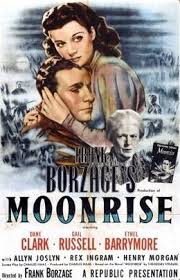
MOONRISE
US, 1948, 90 minutes, Black and white.
Gail Russell, Dane Clark, Ethel Barrymore, Allyn Joslyn, Rex Ingram.
Directed by Frank Borzage.
Moonrise is an interesting melodrama, directed by Frank Borzage, director of many sentimental melodramas of the 30s and 40s. The failure of Moonrise at the box office meant that Borzage was not to make a film for another ten years. He then made China Doll and The Big Fisherman.
This film has a toughness that sometimes underlies some of Borzage's more obviously romantic features. The film focuses on Dane Clark's performance as Danny Hawkins, a young man persecuted as he grew up and bearing a grudge against society. Gail Russell is attractive as a schoolteacher. Ethel Barrymore is once again wise as the grandmother. Allyn Joslyn is the sympathetic sheriff and Rex Ingram is Mose, Danny Hawkins' friend.
While the melodramatic style is contrived, the strength of the performances and the intensity of the plot make for arresting entertainment.
1. Interesting and enjoyable psychological study? Portrait of a community? Exploration of character? Responsibility and guilt?
2. Black and white photography? Authentic locations for the backwoods? The importance of the background, nature? Night and day, light and dark? The title and its symbolism?
3. The portrait of Danny Hawkins - his background, his being persecuted and ridiculed, the reputation of his father? The support of his grandmother? Jerry Sykes and his continued taunts? The grown-ups and the continued clash? Jerry and his malice, Danny's friendship with Gilly? Danny and his bitterness, his anger? The fight with Jerry? The accidental death? Danny and his running away? Protecting himself? The suspicions on the bandleader? Danny's internal fears, his memories of his father, feeling that he might do violence to others? His uneasy conscience? His going into the hills? The support of his grandmother? Gilly and her love and advice? Mose? his understanding? Danny giving himself up? His future? Justice to be done?
4, The youngsters in the small town, their cruelty to one another? Jerry Sykes and his antagonism towards Danny? Breaking up the relationship with Gilly? Young men and the dancing, the fights? Jerry's death? The suspicion of the bandleader and Danny's not coming forward?
5. Gilly and her place in the town, schoolteacher, her love for Danny? Jerry Sykes and his breaking up the relationship? Gilly, going out to see Danny, her love, advice?
6. Danny's grandmother and her living in the swamps, her love for her grandson, her understanding of her son, her explaining things to Danny, helping him cope?
7. Nose and his place in the community, friendship for Danny, support and advice?
8. The sheriff and his authority in the town, the challenges to it, the question of the killing, his investigations, with Gilly? His support of Danny, persuading him to give up?
9. The portrait of pressures, cruelties? justice? Danny as a product of his community?
10. How well did the film, explore characters, situations. tension, consequences?
Published in Movie Reviews
Published in
Movie Reviews
Tagged under
Saturday, 18 September 2021 19:32
Moonraker

MOONRAKER
UK, 1958, 82 minutes, Colour.
George Baker, Sylvia Sims, Marius Goring, Peter Arne,
Richard Leech, Clive Morton, Paul Whitsun- Jones, Gary Raymond, John Le Mesurier, Patrick Troughton, Michael Anderson Jnr.
Directed by David Mac Donald.
The Moonraker is a colourful adventure set in the days after the execution of Charles I. The clash is between Cavaliers and Roundheads. The Moonraker is an English noble who aids royalists wanting to escape to France. The Cavaliers are presented with great dash - and are the heroes of the film.
There is a reasonably sympathetic presentation of the Roundheads with their Puritan style, especially with Marius Goring's Colonel Beaumont. Oliver Cromwell is to be glimpsed in the form of John Le Mesurier.
The film is reminiscent of the action adventures from Hollywood in the '30s: non-stop action, romance, duels to the death. The film is full of English character actors and actresses of the period.
1. An enjoyable action adventure? Historical adventure?
2. Colour photography, the atmosphere of England in the 17th century, the Cavaliers and the Roundheads? Editing and pace? Duels and adventure? Musical score? Title song?
3. The title and the atmosphere of mystery around the Earl of Dawlish? The focus on the civil clash in Britain - audience knowledge of the civil war? The execution of Charles I? The power of Cromwell?
4. The focus on the Earl of Dawlish - seeing him in action, rescuing the royalists, getting them to France? The clashes with the Puritans? His friends, family? Cover? Riding the countryside? In local inns? His encounter with the Puritans in the inn? Major Gregg and the clash? The encounter with Anne Wyndham? Her attraction towards him? Her calling the Roundhead army? The attempt to smuggle Charles I's son to France? Lord Harcourt? The arrival of the troops? The attempted escape? Delaying tactics? The final duel? Anne's change of heart? Beaumont releasing her? A matinee hero?
5. Colonel Beaumont and his leadership of the Roundhead troops? His severity? The demands on Anne? His being summoned by her? His disappointment in her? His letting her go? A man of principle?
6. Oliver Cromwell and his leadership? Troops? Anti-royalist attitudes? The royalists fleeing, the son of the King, Lord Harcourt?
7. The innkeeper and his wife, their support of the royalists, the dangers, their cover? Martin and the danger in the house?
8. Anne and her Puritan style, her engagement to Beaumont, the encounter with Major Gregg, her attraction to , the discovery that he was the Moonraker, her calling the troops, her change of heart?
9. Major Gregg and his cover as Edmund Tyler, spy, his presence in the inn, messages, fight with the Moonraker, death?
10. The comedy with Parfitt?
11. Historical themes? Political themes? In the guise of matinee action adventure?
Published in Movie Reviews
Published in
Movie Reviews
Tagged under
Saturday, 18 September 2021 19:32
Moon Over Miami
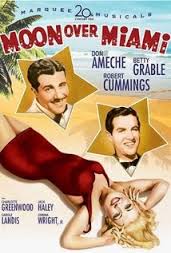
MOON OVER MIAMI
US, 1941, 92 minutes, Colour.
Don Ameche, Betty Grable, Carole Landis, Charlotte Greenwood, Jack Haley.
Directed b Walter Lang.
Moon Over Miami and Three Little Girls in Blue are remakes of a romantic comedy of 1938, Three Blind Mice, with Loretta Young, Joel McCrea? and David Niven.
Moon over Miami and Three Little Girls in Blue are musical versions of the story of sisters looking for rich husbands. Walter Lang, director of many musicals directed Moon Over. The film is an early Betty Grable vehicle and she performs with verve. Don Ameche and Robert Cummings are the suave heroes. Carole Landis is the sister and Charlotte Greenwood is enjoyable as their aunt. Jack Haley also has a role. There are a number of songs including 'You Started Something'. Obviously, Miami is the location for the fortune-hunting.
The story was remade five years later as Three Little Girls in Blue by H. Bruce Humberstone, a director of many Fox musicals. This time there are three sisters, June Haver, Vera- Ellen and Vivian Blaine. The men have less of the spotlight. There are quite a number of songs and dances including 'You Make Me Feel So Young' with a fantasy sequence. A highlight of this version is Celeste Holm as a Southern Belle in her first film. (While the main action is in Atlantic City at the turn of the century, the visit to the southern homestead and the hunt are very reminiscent of Mame.)
The plot was also used in The Greeks Had A Word For Them which was remade as How To Marry A Millionaire.
The story is that of the American Dream: wealthy marriages - but ultimately true love.
1. The style of 20th Century Fox musicals in the 1940s? With stars like Betty Grable, June Haver, Vivian Blaine, Vera-Ellen?
2. Colour photography and chocolate-box style? The musicals scores? The singing, dancing?
3. The plot and its re-use - perennial and in danger of being creaky?
4. The importance of the stars, their personalities and presence, songs and dances?
5. The sisters and their background, coming into money, the plan to go to the city, the deception? The focus on each of the sisters?
6. The hotel, society, potential husbands? Living in high style, meals, dancing, swing music?
7. The deception and the farcical elements, girls and their longings, brooding, comedy?
8. The various mix-ups? People not in love in danger of marrying?
9. Everything being sorted out and true love prevailing?
10. The morality of the American Dream, success, money - but true love?
Published in Movie Reviews
Published in
Movie Reviews
Tagged under
Saturday, 18 September 2021 19:32
Moon in the Gutter/ La Lune Dans Le Caniveau
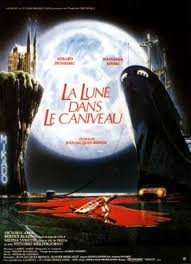
THE MOON IN THE GUTTER (LA LUNE DANS LE CANIVEAU)
France, 1983, 137 minutes, Colour.
Gerard Depardieu, Nastassia Kinski, Victoria Abril.
Jean Jacques Beneix.
The Moon in the Gutter was co-written and directed by Jean-Jacques? Beineix. In 1982 Beineix became famous all over the world with his cult film, Diva. The critics were very harsh on his second film, The Moon in the Gutter. He was later to get back his artistic form as well as critical appreciation (and an Oscar nomination) for his third film Betty Blue.
This film is highly stylised. It is set on the docks of a French city -while the docks seem fairly realistic, their environment (even the sky and the moon clearly are not). Audiences may find the stylised sets and consequent acting style to their liking - or they may definitely not.
The film is very stylish in its production, Panavision and colour photography. It also boasts an excellent cast led by Gerard Depardieu and Nastassia Kinski. However, the film does seem particularly self-conscious in its style, writing and characterisations as well as exploration of themes. Many critics have linked the style of the film to classic '30s and '40s directors like Marcel Carne and Jacques Prevert.
1. An interesting film? Exploration of human nature? Realistic and stylised?
2. The work of Jean Jacques Beineix? Betty Blue? His failure with this film? His successful Diva and the use of studio sets; the atmosphere of location for the docks and the restaurants and hotels, apartments? The stylisation of the dock area, the sky? Use of Panavision and colour? Editing and pace? The length of the film and its mood?
3. The title and its romantic realism? seasons, the night, aspirations? Life in the gutter? The possibility of moving out of the gutter?
4. The strength of the cast? The focus on the moon, times and
Rich and poor? The portrait of Gerard: his work as a stevedore, a big and strong man? His drunken father and his having to cope with him? Lola and her presence in the house, her relationship with Tom? His relationship with Bella? Their love for each other, his refusal to marry? The atmosphere of squalor in the slums? Catherine and the rape? Gerard's obsession about revenge, trying to discover the culprit? His care for Catherine and her attempted suicide? His relationship with his brother Frank, his alcoholism? Gerard on the lookout, the decision to blame Newton Channing7 Channing's wealth, his presence in the dockyard? Drinking in the hotel? Gerard's focus on Loretta? His attraction towards her? Her response? His consciousness of class differences? The sequences between the two, the build-up to falling in love, proposal, the marriage,’ the semi-derelict cathedral? The transition to the morning? The hangover? Gerard with Bella? His discovery of what had happened? His reaction to Bella, to Loretta? At the docks, at work, the fight with the thugs? Bella's revenge? Frank and his blaming himself for the rape of his sister? Gerard's violence towards Frank? His relationship with Jesus, Jesus stopping him harming Frank? Loretta and her arrival? Gerard's confusion? His difficulty in moving from the world of the gutter? His decision to stay? Going back to Bella?
5. Bella and her relationship with Gerard? Love, wanting him to marry her? Catherine and Frank? The dive? Her reaction to Loretta? To the marriage? With Gerard in bed? Telling him what happened? Hysteria, anger? Her influence on the thugs, the bashing of Gerard? her winning out in the end?
6. The contrast with Loretta, relationship with her brother, coming to that part of the town? Her attraction towards Gerard, mutual response? Her slumming or not? Relationship, build-up to the marriage, her waiting? Her leaving? Coming back - the possibility of a permanent relationship with Gerard?
7. Frank, his drinking, his relationship with his brother and sister? His guild, believing himself to be the rapist? His almost becoming Gerard's victim?
8. Newton Channing, his background, the death of his parents, the accident? His guilt? Drinking in the dive? Under suspicion by Gerard? Loretta and her search for him? The effect of his experience in that part of the town?
9. The gallery of minor characters: Tom and his relationship to his son, Lola and her antagonism? Frank? The people in the bar? The people at work?
10. Blending of realism and fantasy? Insight into human nature? Tangled relationships? Vengeance and frustration? Love and sexuality? Differences of class?
Published in Movie Reviews
Published in
Movie Reviews
Tagged under
Saturday, 18 September 2021 19:32
Monsignor Quixote
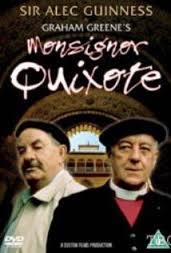
MONSIGNOR QUIXOTE
UK, 1987, 100 minutes, Colour.
Alec Guinness, Leo McKern?, Ian Richardson, Philip Stone, Rosalie Crutchley, Graham Crowden, Maurice Denham.
Directed by Rodney Bennett.
Monsignor Quixote is a telemovie adaptation of the novella by Graham Greene. Written in Greene's old age, it is about society - a bit akin to Don Camillo and his relationship with the communist mayor, Peppone. Monsignor Quixote, like his ancestor the Don, is an idealist, an observer of human nature, naive but seeing goodness everywhere. The Mayor is his Sancho, a man with a communist background, a critic of the religious viewpoint. The two roles are expertly played by Alec Guinness and Leo Mc Kern.
1. The popularity-of Graham Greene's work? His novella? Adaptation as a telemovie? The stars and their performances?
2. A telemovie, British quality? Spanish locations, evocation of atmosphere? Musical score and moods?
3. The title, the link with Don Quixote? His descendant as a Catholic priest? The allegory with Don Quixote's adventures? Updated? The comparisons?
4. Alec Guinness as Monsignor Quixote: in the village, details of his life, study, regrets? The parish? The house and the meals? The bishop: help, the meal, talk, promotion? His way with words? Theresa and her protection? The town and his work? Sancho and being ousted? Politics in Spain, communists? Franco? The civil war?
5. Monsignor Quixote and his talking and arguing with Sancho? Issues, conflict? The decision about the trip? His car being his Rocinante? The police - and the windmills? The journey? Continued talk and discussion? Faith in the Trinity? The wine? The worldly experiences on the trip? The socks? Changing collars? The hearing of confession? The sex film and Monsignor's reaction? The visit to Franco's tomb? Wandering the cities, laughing gently at human nature? The criminal and the Latin? The shoes? The bishop and his anxiety? Avila? Theresa and the phone call? The drive, praying, the visit to the Cistercian monastery? The final Mass? The curate? The bishop and his attitude towards scandal? Death? The madness of the dreamer? Fantasy and realism?
6. The allegory? Leo Mc Kern as the Communist, his story, the seminary, the brothel, faith, Karl Marx? The ousting of Monsignor Quixote? The bishop? The promotion? The journey, talk in the car, Monsignor's socks, the change, the collar, the inquiries? The Basques~ The police? the brothel? The pornographic film? His repenting? Faith and talk? The end?
The bishop from Africa, hospitality, the horse, Pope, promotion?
7. The bishop and the tax collectors? Serious? Suspension? The curate and his age, experience, his pursed lips and attitudes towards Monsignor Quixote?
8. Theresa and her severity, concern, the meals, the phone call, and checking on his safety?
9. The police, their attitudes, the encounters with the travelling two?
10. The Mexicans and the money?
11. The Cistercian monastery and the professor?
12. The background of theology, the teaching authority of the church, Scripture? Simplicity and study? Wisdom? Reconciliation and confession? Life and death?' The effect of each character on the other?
13. The differences of ideology? Difficulties and differences? Franco? Faith? The church? The bond of companions?
Published in Movie Reviews
Published in
Movie Reviews
Tagged under
Saturday, 18 September 2021 19:32
Modern Girls
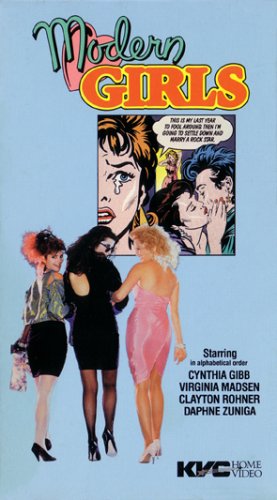
MODERN GIRLS
US, 1986, 84 minutes, Colour.
Virginia Madsen, Cynthia Gibbs, Daphne Zuniga, Clayton Rohner.
Directed by Jerry Kramer.
Modern Girls is a piece of froth about three girls, their jobs, their social life, romance and a night on the town - with an extraordinary number of mishaps. The three girls are attractive young actresses: Cynthia Gibbs, Daphne Zuniga and Virginia Madsen. Clayton Rohner, from TV's daytime-soaps, is pleasantly quiet as the hero (and doubles up as the English rock star).
The film is fairly inconsequential - though it probably mirrors the experience of a number of young adults in the American cities.
1. Pleasant comedy? Drama?
2. The modern city, workplaces, apartments, cars, the streets, nightclubs? The range of music, the nightclubs, songs? The musical score?
3. The title, focus on the girls, their lifestyle, ambitions? Romance, relationships? Modern?
4. The introduction to the three girls at their work: Kelly, Margo, C.C. - and her being sacked? Their going home with each other? The apartment? Their routines at home? The preparation for going out?
5. The three girls and their characters, interests, strengths, weaknesses? Their relationships? Going to the bars? Clifford, survival, his infatuation with Kelly, the other two leading him on, keeping him waiting such a long time, going out with him?
6. The nightclubs, the men and women, the style, getting drinks on other people's accounts? Clifford and his feeling out of place? Dancing? Kelly and the break-up? Margo and her search? C.C. and her infatuation with the English rock singer, contriving to fall on him? His infatuation and search for her?
7. The search for the singer, the other men encountered during the evening, friendships, brutality and attack? The effect of the night on the three girls? Enjoyment, weariness? Disillusionment? Clifford and his continued support - moral, money, the car (and the flat tyres)?
8. The contact with the agent of the rock singer, his infatuation with C.C? The rush to the airport, the farewell?
9. Pleasantly inconsequential look at a night in the life of three modern girls?
Published in Movie Reviews
Published in
Movie Reviews
Tagged under
Saturday, 18 September 2021 19:32
Missing Are Deadly, The

THE MISSING ARE DEADLY
US, 1974, 74 minutes, Colour.
Allen Epstein, Ed Nelson, Leonard Nimoy, Jose Ferrer, Marjorie Lord.
Directed by Don Mac Dougall.
The Missing Are Deadly is an early '70s telemovie, the material familiar from many medical series like Quincy, Trapper John. The film focuses on experiments, a deadly virus and its infection. The final focus is on the struggle to stem the spread of the virus. Ed Nelson looks concerned as the doctor, as does Leonard Nimoy as the doctor with experimenting skills. Jose Ferrer also looks concerned in authority. A young Kathleen Quinlan has a supporting role.
Enjoyable - typical of telemovie and television series material.
1. Interesting and entertaining medical melodrama? Situation, conflict, characters?
2. Telemovie: brevity of running time, situation, characters, soap opera styles, melodramatic conflicts and crises, resolution?
3. The title and the focus on medical experimentation, infected animals, virus, the need for developing serums? The crisis focusing on Jeff and his erratic behaviour? His causing the infection?
4. The plausibility of the plot: medical experiments, funding, decisions about stopping experimentation, reputations and egos? The continued experiment, the erratic behaviour of Jeff, the responsibility of his father? His taking the infected mouse, infecting other people, consequences?, Happy resolution?
5. Dr. Margolin and his Institute, relationship with Max, with the authority figures? His pride? Clash with Max? Neglect of his sons since his wife's death? Relationship with Jeff, his taking the mouse, his handling of the crisis, concern with his sons, Michelle, her ,mother, the time element? The final reconciliation with his sons?
6. Max and his research, the grant, his being told to stop, his continuing? His help in the crisis? Getting the final credit?
7. Jose Ferrer as the authority, the backing of the experimentation, facing the press, decisions?
8. Jeff and his brother, their housekeeper, Jeff's erratic behaviour, their concern about his psychological welfare? His taking his father's card, the mouse? Motivation? The encounters, the infection? His brother driving him? Treatment in the hospital? Michelle?
9. The infected people, hospital treatment? The brother and his concern not to infect others? He and Michelle and their recovery?
10. The perennial appeal of this kind of medical materiall'7 Crisis? Audiences identifying with the-disaster situation? The relief of the resolution?
Published in Movie Reviews
Published in
Movie Reviews
Tagged under